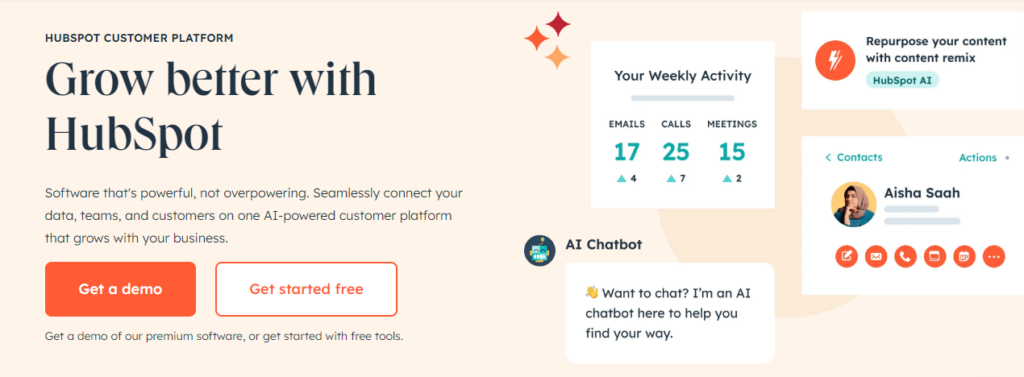How Emotional Intelligence is Becoming the Ultimate Sales Tool

Whether it’s the excitement of trying something new, the comfort of familiar brands, or the joy of treating ourselves, our emotions influence us more than we realize. And the best salespeople use it as an advantage.
A study by Harvard Business Review found that salespeople with a high level of emotional intelligence (EQ) achieved a 15% higher close rate than their peers.
Think about it. When you reflect on the last time you bought something, chances are how you felt about the product, brand, or the experience associated with it influenced your purchase.
Or maybe it was emotion that drove you to buy the product in the first place. Maybe you heard about a home intrusion in your neighborhood. It made you anxious, so you went out and purchased a new home security system.
While most of the time, our emotional decisions aren’t that extreme, this article will teach you how they shape our preferences, perceptions, and, ultimately, our purchasing decisions.
Key Takeaways:
- Having a high emotional quotient helps sellers build rapport, overcome objections, and turn “no’s” into opportunities.
- There are several emotional factors that drive purchases.
- When onboarding or upskilling team members, the right training tactics can improve overall emotional intelligence and benefit everyone.
- Adding the right tools to your tech stack can help you streamline sales processes and improve rapport-building efforts.
What is emotional intelligence in sales?
Emotional intelligence is the ability to recognize, understand, and manage one’s own emotions and those of others in various situations. That’s not to say we can control other people’s emotions, but there are techniques we can learn and use to help de-escalate stressful situations and direct conversations in productive ways.
When customers contact the sales team, they may be curious and have questions, or they may be ready to make a purchase. They may also be frustrated and expect help and a resolution to a problem.
Leveraging emotional intelligence during conversations with customers means:
- Active listening;
- Showing empathy;
- Mirroring the customer’s language;
- Offering real and reasonable solutions.
When salespeople accomplish this, those calls are more likely to result in happy, satisfied customers. And, of course, happy customers are more likely to purchase and become brand ambassadors.
Elevate Your Sales Game with Emotional Intelligence!
Why does emotional intelligence matter in sales?
To better understand the role of EQ in sales, let’s start with a couple of stats.
According to a study by Salesforce, salespeople with high emotional IQs have a 20% lower turnover rate. This creates a huge advantage for the salesperson and the company since replacing an employee can cost between 50% and 150% of that employee’s annual salary.
When sellers are in touch with their own emotions and understand the emotional motivators behind purchase decisions, they’re better able to:
- Create product experiences that resonate with their target audience.
- Connect with their customers on a deeper level.
- Tailor their marketing strategies effectively.
This is where a tool like a composable CDP can improve your sales performance even further. CDPs can ingest data from various sources, including website behavior, purchase history, and past interactions.
An experienced salesperson can leverage this rich customer data to personalize the customer’s shopping experience. They can tailor product recommendations, content suggestions, and marketing messages to each customer’s unique needs and preferences.
Combining data analysis and EQ creates a more emotionally resonant shopping journey, ultimately leading to higher conversion rates.
Transform Your Sales Approach Today!
Building Rapport
Having a high EQ also helps salespeople build rapport with e-commerce customers. They can recognize and empathize with the emotions driving consumer behavior. This advantage directly affects many aspects of customer relations, including:
- Understanding customers’ needs and preferences;
- Being able to offer personalized recommendations and solutions;
- Offering effective communication (e.g., formal or informal).
Let’s look at an example of how a sales rep can use EQ to build rapport with a potential customer.
Imagine that a customer is browsing your SaaS solutions. Their medium-sized business is currently scaling, so they need specific project management tools and integrations. But they aren’t sure which solution is the best fit for them. The customer will probably get frustrated and contact your sales department for help.

Here’s how you’d likely build rapport with this customer:
- Acknowledge their frustration and empathize with their dilemma. Offer ways to make their decision easier.
- Ask the customer specific questions about their preferences and find out their integration and management tools needs.
- After identifying their requirements, offer information about appropriate project management tools and integrations. Explain each spec in detail and ask if they have any additional questions.
Now, let’s go through the process step by step:
Anticipate Needs
Once reps understand and relate well to other people, they can predict their expectations. As the old saying goes, they should put themselves in other people’s shoes.
When reps consider customers’ feelings, history, current situation, and future needs, it becomes clear how they hope to solve problems.
A key aspect of this is customer data. The more quality data your team has, the better they’ll be able to anticipate customer needs.

When sales reps combine data analysis with emotional intelligence, the customer feels seen and heard, which drastically improves their customer experience and ultimately leads to higher conversion rates.
Overcoming Objections
Overcoming objections is another key part of effective e-commerce sales. Reps must be able to understand and address the underlying emotions that make people say no and know how to turn these objections into opportunities.
Active listening is key to understanding customer concerns. It helps empathize with the customer so your team can tailor their responses and solutions accordingly. That way, they can frame responses in a way that appeals to the customer’s needs, desires, and values.
Understand Delayed Gratification
We all love the dopamine rush of instant gratification, but that’s not always possible when you work in sales – in fact, it’s pretty rare. Emotional intelligence is handy when it comes to the norm of delayed gratification. Reps have to understand that the payoff for waiting and all their hard work will be worth it in the long run. This only happens with high emotional intelligence.
In sales, teams need to pour their hearts into all the warm but also cold calls, the emails, the smiles, and the handshakes. As well as embrace all the “no thanks,” “NO!” “Not today” and “Stop calling!” responses that wear their patience thin.
Sales reps can’t give up, even at moments when they really want to. Because eventually, they’ll get that “Yes!” and all the work pays off!
Without emotional intelligence (and a good dollop of persistence, too), a salesperson doesn’t last long at the job.
Handling Rejection
As we mentioned above, a person who has been in sales long enough likely experienced countless “no’s.” It’s important to understand that this comes with the job.
If someone decides not to go through with a purchase, it’s not a personal rejection. Instead, reps should look at it as an opportunity to understand the customer’s concerns or reasons for declining and to address them accordingly.
The decision to say “no” could be for many reasons, such as budget, bad timing, or specific needs that your product or service may not meet at the moment.
Even though rejection isn’t a reflection of abilities, having emotional intelligence will allow your sales team to see it as a chance to learn and have the motivation and persistence to keep trying.
Take Your Sales to the Next Level!
How to teach salespeople emotional intelligence
If you are onboarding a new team member or upskilling existing employees, here are some methods to maximize their training:
- Role-playing: Managers or other team members can role-play various scenarios to practice appropriate responses and brainstorm different ways to handle customer issues.
- Coaching/Mentoring: Experienced team members can share their experiences with newer team members and advise them on how to handle certain scenarios.
- SOPs/Training Manuals: Create standard operating procedures (SOPs) or training manuals that include all company expectations and standards regarding how to handle customer conversations and complaints. Include interactive content, such as training videos with voiceovers, to enhance learning and accessibility for all team members.
- Feedback: Schedule regular one-on-one meetings with direct reports to offer constructive feedback regarding their performance and to answer any questions they may have.
Emotional intelligence in sales: Best practices
We’ve discussed why emotional intelligence is essential if reps want to excel in sales, but it’s also important to follow best practices. These will ensure you remain not only fiscally successful but also ethically irreproachable.
- Put your customers first. Simple. Sales is about relationships anyway, and when you add emotional intelligence to the mix, it only amplifies that aspect. Reps should take care of your customers, and you take care of your reps.
- Don’t control, collaborate. Customers want to feel like partners. They don’t want to feel like they’re being sold to – they must feel like they’re participating in a decision. It’s called a consultative selling approach.
- Provide long-term value. Like we said, sales is all about relationships, so invest in them beyond the sale. Offer your customers more information, such as industry insights, relevant referrals, or ongoing support.
Now, let’s look at the different emotion-driven factors that motivate customers to buy.
Life Success – Life success often drives a need to purchase something meaningful.
- This motivator involves the pursuit of goals, aspirations, and dreams that create a sense of fulfillment and well-being.
- Reps have to connect with customers on a deeper level – beyond the features and benefits of your product or service.
- The team must get to know the customers’ aspirations, challenges, and motivations related to life success.
- Position your product or service in a way that shows them how it aligns with their values and priorities.
Security – Security is all about feeling safe and pursuing goals without worry.
- People want to protect themselves, their loved ones, or belongings from harm, uncertainty, or risk. It comes from the innate need to survive.
- Salespeople can reassure prospects that they’re committed to security and reliability.
- They can do this by emphasizing your company’s reputation for delivering trustworthy products and services.
- They should back this up with evidence, such as customer testimonials, positive customer feedback, and industry certifications.
Sense of Well-Being – Well-being encompasses health and comfort.
- When customers buy products, they want a stress-free experience, which contributes to their overall sense of well-being.
- An emotionally intelligent salesperson will understand they must highlight a product’s ease of use and ability to solve pain points.
- Features must appeal to customers who prioritize their health and comfort.
Stand Out From the Crowd – This refers to one’s desire to be unique.
- Customers want to feel special, as if your product is tailor-made for them and the experiences you offer cater to their unique needs and preferences.
- From exclusive offers to personalized product recommendations, reps should delight customers and make them feel special.
Elevate Your Sales Game with Emotional Intelligence!
Conclusion
Emotion rules everything, whether it’s deciding what to eat for breakfast, choosing a career path, or making other big life decisions.
Combine emotions with decisions, and you’ll get a complex interplay that influences customers’ purchases and experiences with brands.
Follow the strategies outlined in this article to build your teams’ emotional intelligence. Make sure they are always in tune with e-commerce customers’ wants and needs.
FAQs
What role does emotional intelligence play in sales?
Emotional intelligence plays a crucial role in sales by enabling sales professionals to build stronger relationships with clients, understand and respond to customer emotions, and effectively handle objections. It helps in creating a positive rapport, which leads to increased trust and, ultimately, higher sales success.
How to increase EQ for sales?
To increase emotional intelligence (EQ) for sales, practice active listening to fully understand customer concerns, develop empathy to connect with clients on a personal level, manage stress to maintain composure during challenging situations, and seek regular feedback to enhance self-awareness and improve interpersonal skills.
What are the four examples of emotional intelligence?
Four examples of emotional intelligence are:
Self-awareness: Recognizing and understanding your own emotions.
Self-regulation: Managing your emotions in healthy ways.
Empathy: Understanding and sharing the feelings of others.
Social skills: Building and maintaining healthy relationships.
What is the emotional approach in sales?
The emotional approach in sales involves understanding the emotional needs and motivations of customers. It focuses on building trust by addressing these emotional aspects, leading to stronger connections and more effective sales interactions. This approach helps in creating a more personalized and impactful sales experience.
















